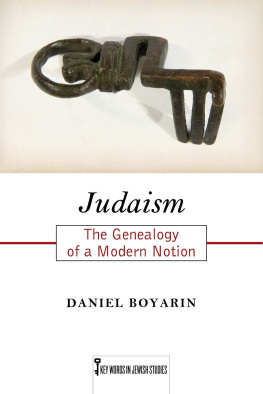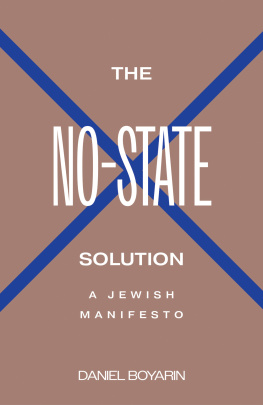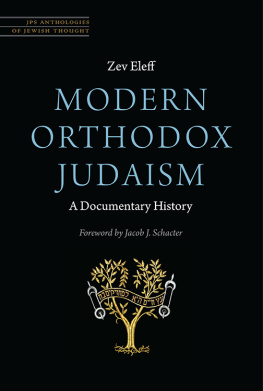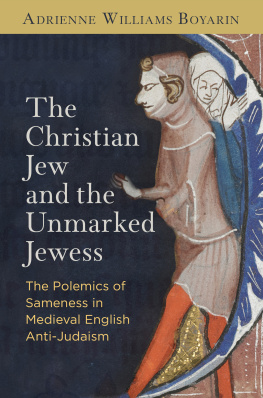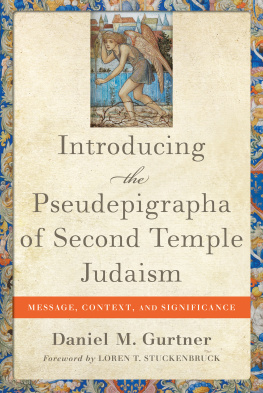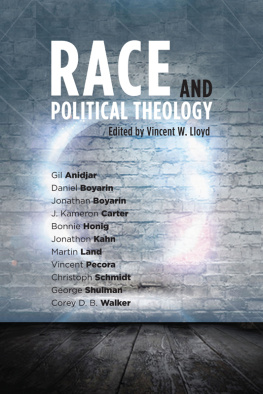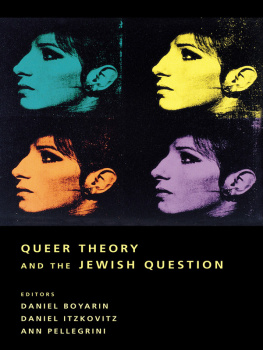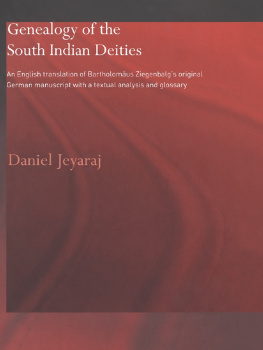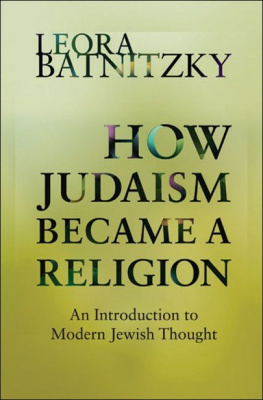Daniel Boyarin - Judaism: The Genealogy of a Modern Notion
Here you can read online Daniel Boyarin - Judaism: The Genealogy of a Modern Notion full text of the book (entire story) in english for free. Download pdf and epub, get meaning, cover and reviews about this ebook. year: 2018, publisher: Rutgers University Press, genre: Religion. Description of the work, (preface) as well as reviews are available. Best literature library LitArk.com created for fans of good reading and offers a wide selection of genres:
Romance novel
Science fiction
Adventure
Detective
Science
History
Home and family
Prose
Art
Politics
Computer
Non-fiction
Religion
Business
Children
Humor
Choose a favorite category and find really read worthwhile books. Enjoy immersion in the world of imagination, feel the emotions of the characters or learn something new for yourself, make an fascinating discovery.
- Book:Judaism: The Genealogy of a Modern Notion
- Author:
- Publisher:Rutgers University Press
- Genre:
- Year:2018
- Rating:4 / 5
- Favourites:Add to favourites
- Your mark:
- 80
- 1
- 2
- 3
- 4
- 5
Judaism: The Genealogy of a Modern Notion: summary, description and annotation
We offer to read an annotation, description, summary or preface (depends on what the author of the book "Judaism: The Genealogy of a Modern Notion" wrote himself). If you haven't found the necessary information about the book — write in the comments, we will try to find it.
Judaism: The Genealogy of a Modern Notion — read online for free the complete book (whole text) full work
Below is the text of the book, divided by pages. System saving the place of the last page read, allows you to conveniently read the book "Judaism: The Genealogy of a Modern Notion" online for free, without having to search again every time where you left off. Put a bookmark, and you can go to the page where you finished reading at any time.
Font size:
Interval:
Bookmark:
Key Words in Jewish Studies
Series Editors
Deborah Dash Moore, University of Michigan
MacDonald Moore, Vassar College
Andrew Bush, Vassar College
I. Andrew Bush, Jewish Studies
II. Barbara E. Mann, Space and Place in Jewish Studies
III. Olga Litvak, Haskalah: The Romantic Movement in Judaism
IV. Jonathan Boyarin, Jewish Families
V. Jeffrey Shandler, Shtetl
VI. Noam Pianko, Jewish Peoplehood: An American Innovation
VII. Deborah E. Lipstadt, Holocaust: An American Understanding
VIII. Cynthia M. Baker, Jew
IX. Daniel Boyarin, Judaism: The Genealogy of a Modern Notion
Daniel Boyarin

Rutgers University Press
New Brunswick, Camden, and Newark, New Jersey, and London
Library of Congress Cataloging-in-Publication Data
Names: Boyarin, Daniel, author.
Title: Judaism : the genealogy of a modern notion / Daniel Boyarin.
Description: New Brunswick, New Jersey : Rutgers University Press, [2018] |
Series: Key words in Jewish studies | Includes bibliographical references and index.
Identifiers: LCCN 2018004644 | ISBN 9780813571621 (cloth) | ISBN 9780813571614 (pbk.) | ISBN 9780813572642 (epub) | ISBN 9781978801769 (kindle)
Subjects: LCSH: Hebrew languageEtymology. | Judaism.
Classification: LCC PJ4801 .B69 2018 | DDC 296.01/4dc23
LC record available at https://lccn.loc.gov/2018004644
A British Cataloging-in-Publication record for this book is available from the British Library.
Copyright 2019 by Daniel Boyarin
All rights reserved
No part of this book may be reproduced or utilized in any form or by any means, electronic or mechanical, or by any information storage and retrieval system, without written permission from the publisher. Please contact Rutgers University Press, 106 Somerset Street, New Brunswick, NJ 08901. The only exception to this prohibition is fair use as defined by U.S. copyright law.
www.rutgersuniversitypress.org
For Chava  , on our fiftieth,
, on our fiftieth, 

We must set out on the slow road of detailing, and we must renounce the idea that detail means trifle.
Max Weinreich, History of the Yiddish Language
The Rutgers book series Key Words in Jewish Studies seeks to introduce students and scholars alike to vigorous developments in the field by exploring its terms. These words and phrases reference important concepts, issues, practices, events, and circumstances. But terms also refer to standards, even to preconditions; they patrol the boundaries of the field of Jewish Studies. This series aims to transform outsiders into insiders and let insiders gain new perspectives on usages, some of which shift even as we apply them.
Key words mutate through repetition, suppression, amplification, and competitive sharing. Jewish Studies finds itself attending to such processes in the context of an academic milieu where terms are frequently repurposed. Diaspora offers an example of an ancient word, one with a specific Jewish resonance, which has traveled into new regions and usage. Such terms migrate from the religious milieu of Jewish learning to the secular environment of universities, from Jewish community discussion to arenas of academic discourse, from political debates to intellectual arguments and back again. As these key words travel, they acquire additional meanings even as they occasionally shed long-established connotations. On occasion, key words can become so politicized that they serve as accusations. The sociopolitical concept of assimilation, for example, when turned into a termassimilationistdescribing an advocate of the process among Jews, became an epithet hurled by political opponents struggling for the mantle of authority in Jewish communities.
When approached dispassionately, key words provide analytical leverage to expand debate in Jewish Studies. Some key words will be familiar from long use, and yet they may have gained new valences, attracting or repelling other terms in contemporary discussion. But there are prominent terms in Jewish culture whose key lies in a particular understanding of prior usage. Terms of the past may bolster claims to continuity in the present while newly minted language sometimes disguises deep connections reaching back into history. Attention must be paid as well to the transmigration of key words among Jewish languagesespecially Hebrew, Yiddish and Ladinoand among languages used by Jews, knitting connections even while highlighting distinctions.
An exploration of the current state of Jewish Studies through its key words highlights some interconnections often only glimpsed and holds out the prospect of a reorganization of Jewish knowledge. Key words act as magnets and attract a nexus of ideas and arguments as well as related terms into their orbits. This series plunges into several of these intersecting constellations, providing a path from past to present.
The volumes in the series share a common organization. They open with a first section, Terms of Debate, which defines the key word as it developed over the course of Jewish history. Allied concepts and traditional terms appear here as well. The second section, State of the Question, analyzes contemporary debates in scholarship and popular venues, especially for those key words that have crossed over into popular culture. The final section, In a New Key, explicitly addresses contemporary culture and future possibilities for understanding the key word.
To decipher key words is to learn the varied languages of Jewish Studies at points of intersection between academic disciplines and wider spheres of culture. The series, then, does not seek to consolidate and narrow a particular critical lexicon. Its purpose is to question, not to canonize, and to invite readers to sample the debate and ferment of an exciting field of study.
Andrew Bush
Deborah Dash Moore
MacDonald Moore
Series Co-Editors
This is a book about a word, a key word, arguably one of the most key of key words for Jewish studies. We scholars talk about Judaism constantly, and nonscholars do too. There is Second-Temple Judaism, rabbinic Judaism, medieval Judaism, modern Judaism, even orthodox Judaism. It seems highly significant, however, that there is no word in premodern Jewish parlance that means Judaism; indeed, from a linguistic point of view, only modern Judaism could be said to exist at all. When the term Ioudaismos appears in non-Christian Jewish writingto my knowledge only in 2 Maccabeesit doesnt mean Judaism, the religion, but the entire complex of loyalties and practices, including dress, speech, and also sacrifice, that mark off the people of Judea (what we call now Jewishness); after that, it is used as the name of the Jewish religionitself a highly problematic termonly by writers who do not identify themselves with and by that name at all, until, it would seem, the nineteenth century.
Paul, n Saul, is an excellent example.and Iudaismus and their vernacular cognates were in fairly constant usage from at least the second century on. This further complicates matters and makes them interesting.
Font size:
Interval:
Bookmark:
Similar books «Judaism: The Genealogy of a Modern Notion»
Look at similar books to Judaism: The Genealogy of a Modern Notion. We have selected literature similar in name and meaning in the hope of providing readers with more options to find new, interesting, not yet read works.
Discussion, reviews of the book Judaism: The Genealogy of a Modern Notion and just readers' own opinions. Leave your comments, write what you think about the work, its meaning or the main characters. Specify what exactly you liked and what you didn't like, and why you think so.

